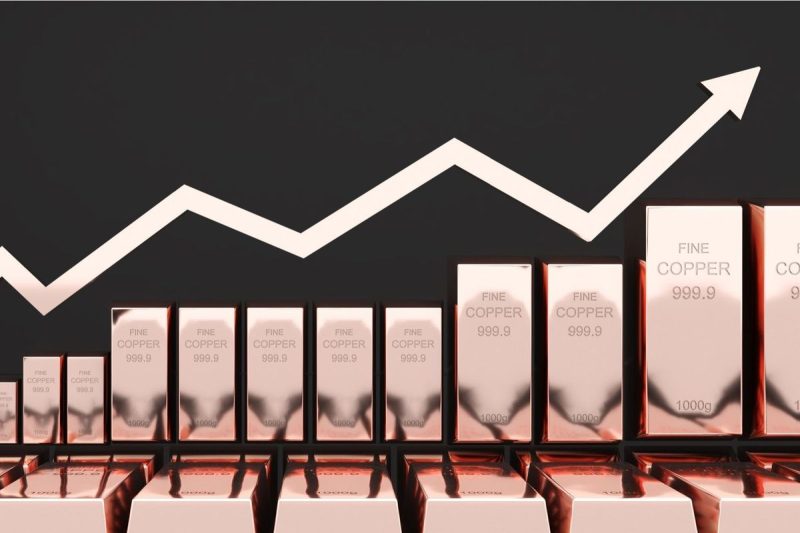Copper has long been held up as a key indicator of global economic health, and as the world electrifies it’s taking on a new shine, making it a potentially compelling choice for green-minded investors.
Often called Dr. Copper, copper is one of the most followed base metals, and its high ductility and electrical conductivity make it the third most consumed industrial metal, behind iron ore and aluminum, as per the US Geological Survey.
Given its attributes, copper is often used for electrical purposes such as power transmission and generation. And like its base metal sibling nickel, it has a major role in the electric vehicle revolution, with experts at S&P Global expecting consumption of copper to jump 20 percent by 2035 due to demand from the green energy market.
Read on to get an idea of the supply and demand dynamics that move the copper price, as well as how to invest.
What factors impact copper supply and demand?
Copper supply is prone to disruptions in various capacities: environmental events, worker strikes, economic fluctuations and so on. For that reason, it’s important to keep an eye on what’s happening in the world’s major copper producers, such as Chile, Peru and China. Global events like the COVID-19 pandemic can also play a role in market dynamics.
Indeed, copper had a breakout year in 2021. Copper futures on the London Metal Exchange reached what was then a new peak of over US$10,700 per metric ton on the back of higher demand projections.
In May 2022, the red metal repeated that performance to reach another fresh high of US$10,845, propelled upward by expectations of strong demand from electric vehicle and renewable energy applications. The metal’s price on the COMEX also reached new highs on a per pound basis in 2021 and 2022.
Copper supply and demand are also being affected by Russia’s war in Ukraine, which has contributed to higher energy prices and other inflationary pressures. Russia is one of the top copper-producing countries.
China, another top copper-producing country, is also the world’s largest consumer of the red metal, and fluctuations in the strength of its economy often have major implications for copper prices. This was the story for 2023 as prices declined to as low as US$7,812 in October alongside the worsening crisis in China’s real estate market. The industry represents a whopping 30 percent of the country’s GDP and is a primary consumer of the red metal.
Although China’s economic woes are persisting in 2024, global copper mine supply is tightening at the same time as copper demand from the energy transition rises. The closure of First Quantum Minerals’ (TSX:FM,OTC Pink:FQVLF) Cobre Panama mine, guidance cuts from Anglo American (LSE:AAL,OTCQX:AAUKF) and declining production at Chile’s Chuquicamata mine are exacerbating an already tenuous supply situation.
These complex dynamics led the copper price to climb by nearly 35 percent from the start of this year to reach its highest recorded COMEX price of US$5.20 per pound, or US$11,464, on May 20. Copper also broke its futures high that day, trading at a price of US$11,104.50 on the London Metal Exchange.
Looking forward, the consensus among experts is that although copper may face short-term headwinds, its long-term future looks solid. Some market watchers have big-picture concerns for copper output, predicting that prices for the red metal will remain high well into the future as supply struggles to keep up with demand.
What are the ways to invest in copper?
Exchange-traded funds (ETFs), futures and mining stocks are common methods of investing in copper.
For investors looking to invest in physical copper, purchasing copper is possible, and copper is sold in rounds and bars of various weights. However, due to its relatively cheap price per pound compared to other common investment metals, a decent physical copper position would take up a lot space, making physical copper an inefficient investment option.
In the case of a copper ETF, investors are able to access the copper market indirectly by looking at funds focused on copper or copper-mining companies. ETFs are seen as a lower-risk way to invest.
Meanwhile, copper futures contracts give investors a chance to take part in the market in another fashion — according to InvestingAnswers, “(Futures) allow buyers and sellers to ‘lock in’ the price at which they buy or sell an asset in the future.” This can create a safety net for investors while still providing copper price exposure; however, on the flip side, the leverage that futures trading provides can make it a risky endeavor best left to professionals.
Lastly, there are copper stocks, which can be risky, but are one of the most direct routes to the market. Investors can buy shares of firms involved in copper mining, development and exploration, and ride the ebb and flow of both these companies’ performance and the copper price. Typically, more advanced companies are less risky compared to juniors.
Some of the largest copper-mining companies are Freeport-McMoRan (NYSE:FCX), Glencore (LSE:GLEN,OTC Pink:GLCNF), BHP (ASX:BHP,NYSE:BHP,LSE:BHP) and Rio Tinto (LSE:RIO,NYSE:RIO,ASX:RIO). For other ideas on copper stocks, check out our lists of the top-performing companies listed on the TSX, TSXV and ASX.
Securities Disclosure: I, Melissa Pistilli, hold no direct investment interest in any company mentioned in this article.

